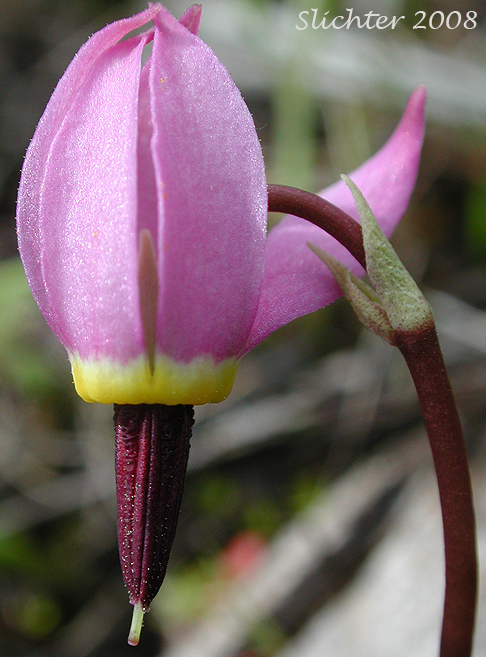 The photo at right shows another close-up of the
flower of desert shooting star as seen near the west rim of the Klickitat Canyon NRCA to the east of Mt. Adams ..........April 27, 2008. Note also the narrow stigma.
The photo at right shows another close-up of the
flower of desert shooting star as seen near the west rim of the Klickitat Canyon NRCA to the east of Mt. Adams ..........April 27, 2008. Note also the narrow stigma.
Desert shooting star is an attractive perennial wildflower with a basal rosette of leaves and erect stem from 5-20 cm tall. The leaves are lanceolate to oblanceolate, spatulate, or obovate, 3-20 cm long, usually several times longer than wide, with entire margins and a smooth to lightly pubescent surface.
The 1-10 flowers have floral parts in fives, with the stigma not enlarged and the filaments are free, yellowish or purple, and usually not over 1-1.5 mm long. The anther connectives are strongly transversely wrinkled and from deep red to purple. The anthers are from 6-8 mm long. The tube at the base of the petals is yellowish with a wrinkled red ring. The corollas are 1-3 cm long. The reflexed petals are purplish.
Key identifying Characteristics:
1. Stem and leaves nonglandular, with the leaves fairly fleshy and non-toothed.
2. Filaments only 1-1.5 mm long, giving the stamens the appearance of being very short.
3. The filaments are not yellow.
Desert shooting star is a wildflower of seasonally moist open grasslands or sagebrush in the plains, foothills and montane zones of the west. It is also found in moist meadows along streams.
Desert shooting star may be found from the east slopes of the Cascade Mts. east to Alberta and Wyoming, north to British Columbia, and south to northern California.